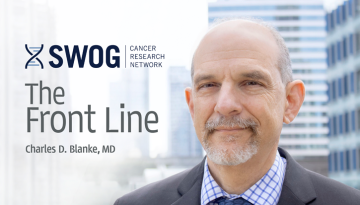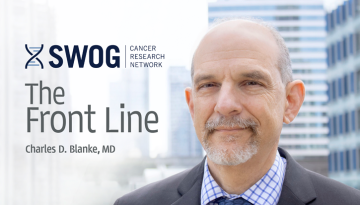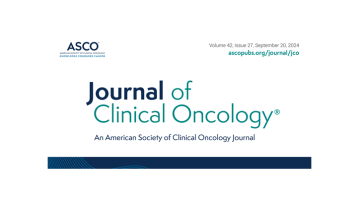Refining the Group Chair Election Process?
With 99% certainty, I can tell you SWOG’s Board of Governors will elect a new group chair one year from now. Given that my final term as chair doesn’t end until 2025, next spring is a little early, and that person will serve as chair-elect for a long period. But this timing will allow the successful candidate to imprint their stamp on our next NCTN grant application, which we will need to draft during late 2023.
Ahead of next spring’s election, the SWOG Executive Advisory Committee proposes updating the election bylaws to help ensure an efficient process that also selects the best candidate. The proposal is to move to a single-candidate model, similar to that adopted by other organizations, such as ASCO.
We’re still finalizing some of the details of our proposal for SWOG, in part based on input from a call with the Board of Governors members earlier this week, but here are the highlights:
- The search and nominating committee (membership to be specified in our bylaws) interviews as many candidates as are eligible and appropriate
- The committee narrows its list to eventually nominate a single group chair candidate
- That candidate selects a deputy chair candidate
- The Board of Governors then votes yes or no on this candidate team by a simple majority vote
SWOG rank and file members can contribute directly to this process by bringing outstanding candidates to the attention of the nominating committee. Here are some of the potential advantages of our proposal over the current election model:
- It doesn’t subject candidates to the public rejection and discouragement that can result from a loss in a contested election
- It minimizes the polling boosts offered by name recognition and popularity, which are typically tied to marginally relevant factors such as a candidate’s specialization
- It allows the nominating committee, whose members have extensive knowledge of cooperative group operations and leadership, to put forward the candidate whose skill set and experience best match the current, and projected future, demands of the position
- It reduces the impact of hidden biases that can limit diversity in election outcomes
- It for the first time gives the Board of Governors a voice in selecting the group’s deputy chair
- It lessens the potential for public discord and contention over a contested election
- It allows the nominating committee, all of whose members have contributed to previous applications to renew SWOG’s NCI grants, to identify the candidate most qualified to direct our next application, which will be the incoming chair-elect’s most immediate task
The Search and Nominating Committee
SWOG’s bylaws specify that the committee that nominates candidates for group chair be led by the group statistician. Our proposal rounds out this team with the longest-serving chairs from our NCORP, NCTN, and research support committees (they are unlikely candidates for group chair-elect). It adds the chairs of our patient advocate, recruitment and retention, and oncology research professionals committees, and includes a senior PI from our NCORP sites – possibly one elected by a vote of NCORP site PIs (TBD). Finally, the nominating committee would also include in ex officio roles SWOG’s chief of administration, its director of operations, and The Hope Foundation’s CEO.
I realize this proposal would be a major change for SWOG, and I anticipate a robust pre-vote discussion at the BOG meeting in April. But I agree with ASCO it would ensure the best candidate possible gets elected and becomes SWOG group chair – one who has mastered the skills that are most essential to the group’s continued success.
One goal is to make the policy we ultimately vote on as tight, and as representative, as possible. For this reason, I presented an initial version of the proposal on a Board of Governors call earlier this week. The final version will be presented to the Board before its meeting in Seattle next month, where the proposal will be discussed and formally voted on.
Watch this space after the group meeting for an update on the outcome of that discussion and that vote.
Other Recent Stories



